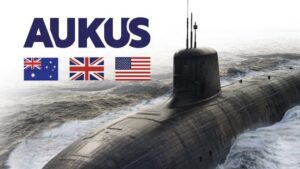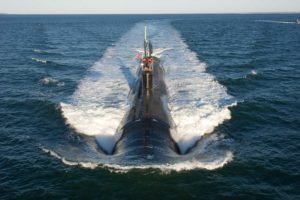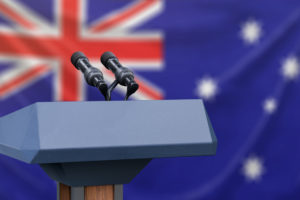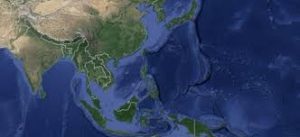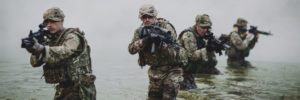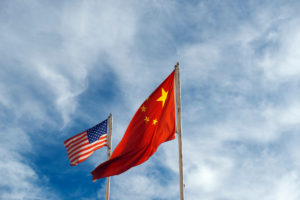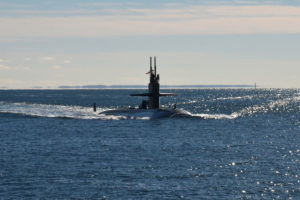On September 15, 2021, Australia, the United Kingdom, and the United States formed AUKUS, which is described as a trilateral security partnership designed to make it easier to share information “to better meet the threats of today and tomorrow” in the Indo-Pacific. It is initially focusing on two lines of efforts: submarines and advanced technology. Since the announcement, the trio has held multiple high-level meetings (Senior Officials Groups, Joint Steering Groups, and Working Groups) to advance concepts to support the partnership.
While this appears to be a very technologically focused initiative, there is an opportunity to employ other capabilities of the three nations to counter malign activities in the human domain and the so-called “gray zone.” A Special Operations Forces (SOF) working group should be added to develop concepts to expand the AUKUS concept beyond technology.
Although never specified in the official statements on AUKUS, one of the intentions of the partnership is to counter the threat from China. This involves a focus on mutual development of advanced technologies to support large-scale combat operations (LSCO). While LSCO is the most dangerous threat for AUKUS and the region, the dominant conditions of the security environment are strategic competition and activities in the gray zone. Two of the most disruptive and troublesome activities are China’s One Belt One Road initiative and its practice of the “Three Warfares”—psychological warfare, legal warfare (or lawfare), and media (or public opinion) warfare—to expand its regional and global influence.
China is a threat to the Indo-Pacific, democratic nations around the world, and the rules-based international order. It seeks to export its authoritarian political system around the world in order to dominate regions, co-opt or coerce international organizations, create economic conditions favorable to China alone, and displace democratic institutions.
China leads with influence. For its leaders, politics is war by other means. George Kennan and Paul Smith provided the intellectual foundations of political warfare, including what is clearly the Chinese method: “the use of political means to compel an opponent to do one’s will, based on hostile intent.” This must be resisted, and friends, partners, and allies need a sufficient amount of resilience to protect themselves from Chinese influence and malign activities. The United States tends to want to lead with kinetic operations and, in the traditional Clausewitzian view, considers war an extension of politics. AUKUS needs the ability to lead with proactive influence, and AUKUS SOF can support the diplomatic and informational instruments of power.
The U.S. National Defense Strategy fact sheet summarizes the three key concepts for preparing for LSCO and operating in strategic competition: integrated deterrence, campaigning, and building enduring advantages. Clearly, a major intent of AUKUS is to build enduring advantages, and the combined strength of the three militaries will support the diplomatic, informational, and economic instruments of national power. However, in strategic competition and operations in the the gray zone, campaigning is also required to create resistance to and resilience against malign activities being conducted by not only China, but also Russia and North Korea. AUKUS SOF could be used to advise and assist friends, partners, and allies to develop resilience.
An AUKUS SOF working group could examine the feasibility of developing a combined campaign plan for SOF support to strategic competition. One of the considerations will be whether to establish a campaign headquarters for planning and possibly for command and control and support to operations. Ideal logical locations would be Australia or Guam, but if strategic messaging is a consideration, a headquarters in the South Pacific Islands, Singapore, or Thailand might be advantageous. The location will depend on the political considerations of the host nation(s), the desired strategic effects, as well as the ability to plan, conduct, and support operations from the chosen location(s).
All three nations’ SOF have been decisively engaged for the past two decades in support of the global war on terrorism. Each has developed very high-end capabilities to capture/kill high-value targets. This capability is necessary to support national security and must be sustained. However, while all three nations invest heavily in SOF, the forces remain relatively small and the have been spread rather thin. Approaching the Indo-Pacific from a combined SOF perspective may allow forces to share the wealth and spread the pain of continuous long-term deployments. It may also allow the nations to continue to sustain high-end SOF, train for support to LSCO, and be prepared to execute contingency operations in support of national emergencies.
AUKUS SOF could be employed in ways that might be described as the “two SOF trinities.” The first are the three overarching missions of SOF in relation to the high-end capabilities required for counterterrorism:
- Irregular Warfare
- Unconventional Warfare
- Support to Political Warfare
The second trinity is the comparative advantage of SOF:
- Influence
- Governance
- Support to indigenous forces and populations
These missions and comparative advantages lay out the focus for the types of activities and support AUKUS SOF could provide. A campaign headquarters would determine the ways and means that SOF could achieve strategic objectives through these efforts.
The SOF of the three nations are not fungible. They are not “one size fits all.” A campaign approach is required to ensure the right forces are employed for the right missions to achieve strategic effects. In addition to capabilities, SOF have developed unique and often strong and enduring relationships with various countries throughout the Indo-Pacific. For example, U.S. SOF has a long relationship with the Philippines, Australian Special Air Service (SAS) with Indonesia, and UK SAS with Malaysia. These relationships provide the foundation for effective employment of AUKUS SOF when tasked with the right capabilities from each nation.
U.S. and NATO SOF have pioneered a resistance operating concept in Europe. Its effectiveness has been borne out by the Ukrainian resistance forces as well as other frontline NATO countries that are developing resilience among the population and the ability to resist Russian “Little Green Men.” Although its employment for unconventional deterrence did not prevent Russia’s attack, the effectiveness of the Ukrainian resistance may give others pause and strengthen the concept of unconventional deterrence in other situations and regions.
However, there is not a cookie-cutter template for resistance. While a case can and should be made that there are potential similarities between Ukraine and Taiwan, China is conducting other malign or subversive activities against other countries via One Belt, One Road that might allow them to achieve their strategic objectives without kinetic operations, particularly by employing the “Three Warfares.” AUKUS SOF could develop country-specific resistance operating concepts to address these threats.
Australian, UK, and U.S. SOF have unique capabilities; some are overlapping and others mutually supporting and reinforcing. A campaign headquarters is necessary to uniquely task-organize the forces for each specific country to support the AUKUS strategic objectives. A model for consideration might be the 1st Special Forces Command’s cross-functional teams. However, rather than relying solely on U.S. capabilities, the right capabilities can be drawn from each country. This includes operators who have developed effective relationships with the right people in the host nation that will contribute to achieving AUKUS SOF campaign objectives–the right people with the right relationships.
An AUKUS campaign headquarters could consider how to employ specially task-organized combined teams. They could be deployed on a rotating basis of four- to six-month deployments. However, this type of rapid turnover disrupts continuity and can hinder the development of strong, long-term relationships. Another option is to establish long-duration permanent task forces that would remain in place with staggered individual rotations so that continuity is sustained and the focus remains on long-term effects.
Permanently deployed task forces of sufficient scale could be problematic from a personnel management standpoint. However, an AUKUS SOF campaign headquarters could consider a hybrid concept. This could entail establishing small but self-sufficient detachments that would remain in place, develop relationships, conduct assessments, and establish requirements for rotating SOF to deploy and accomplish specific missions. The United States has long experience establishing permanent detachments uniquely organized and suited for specific missions in specific countries. These include DET-A or the Berlin Detachment, the 46th Company in Thailand, The Special Forces Taiwan Resident Detachment, and Special Forces Detachment Korea (SFD-K now DET 39), which remains operational to this day. Each of these are unique organizations tailored for the mission. Some of these detachments were responsible for extensive unilateral operations, others advisory operations, and some of them for supporting the temporary deployment of other SOF to conduct specific missions.
Other historical examples might be useful for an AUKUS SOF working group to consider. For strategy and campaign development, the U.S. Overseas Internal Defense Policy (OIDP) could provide a framework for developing concepts adapted to counter certain malign activities. A template for assessing the conditions throughout the Indo-Pacific might be the report by Brig. Gen. Richard G. Stilwell called Army Activities in Underdeveloped Areas Short of Armed Conflict in 1962. This provides an in-depth assessment that supports campaign plan development based on the guidance of the OIDP. After the OIDP was issued, the U.S. Army created the Special Action Force in doctrine and established two organizations, the 8th SAF in Panama and SAFASIA in Okinawa, Japan. These were self-contained organizations that, although focused on counterinsurgency operations, may offer lessons for today, especially with regard to establishing an AUKUS campaign headquarters.
An AUKUS SOF working group would also consider if developing a concept for resistance and resilience in Asia is feasible and desirable. It would need to assess whether there is potential for friends, partners, and allies to resist Chinese political warfare and if that resistance can be channeled to achieve strategic effects to counter such malign activities. China. This would be best done by a campaign headquarters that could conduct a thorough and continuous analysis by appreciating the context, developing deep understanding of the problem, and then developing multiple country-specific approaches that would create dilemmas for China and other revisionist or rogue powers and make them question their ability to achieve their objectives.
One consideration might be to reprise the U.S. Special Forces Taiwan Resident Detachment as a combined AUKUS organization. AUKUS could permanently station a small combined detachment to advise and assist the Taiwanese military and civil defense forces in implementing a porcupine defense, which would include creating the conditions needed to make it impossible for China to pacify the population if it invaded. This organization would assess the need for training and advanced capabilities, which could be provided by rotational SOF elements from each country. The decision to establish an AUKUS SOF detachment in Taiwan would have to be made by the national political leaders of each country due to the political sensitivity, but this is an option an AUKUS SOF working group might consider.
AUKUS is a modern security partnership well suited to meet the interests of the three nations. Although it is currently focused on information sharing and advanced technology, it provides the framework and opportunity to expand the scope to look at the security challenges of the gray zone and Chinese malign activities. AUKUS SOF can play a part in strategic competition and help mitigate the damage done to the region and international community by China and others. The SOF capabilities could be effectively employed to maximize their contributions to integrated deterrence. A joint SOF campaign could also contribute to the trilateral security interests of AUKUS. Establishing an AUKUS SOF working group is necessary to explore the capabilities and possibilities.
